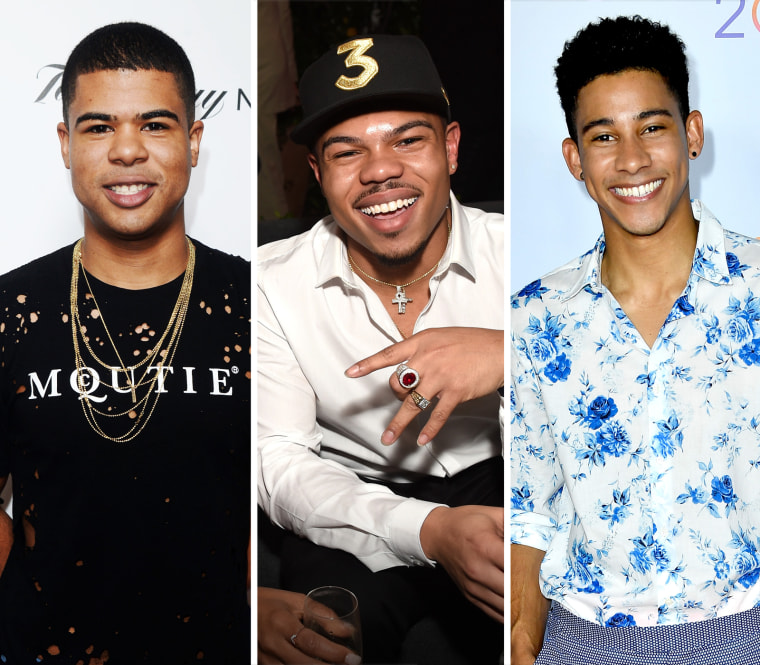It’s been more than two decades since Ellen DeGeneres graced the cover of TIME magazine with the accompanying words, “Yep, I’m gay.” Since then, several other celebrities and public figures have had high-profile coming out moments on magazine covers and in online news articles. Notable examples include “Star Trek” actor George Takei in Frontier magazine in 2005, Lance Bass on the cover of People in 2006 and NBA player Jason Collins on Sports Illustrated’s cover in 2013.
While plenty of public figures still take advantage of traditional media to share this milestone moment, the advent of social media has restructured the celebrity coming out story and has led many LGBTQ stars to circumvent the traditional route.
“Social media has allowed celebrities and public figures to control their own narratives, and that includes coming out,” Trish Bendix, managing editor of LGBTQ news site INTO, told NBC News.
Bendix, who has covered a number of celebrity coming out stories, said this direct-to-follower approach also “allows for fans to feel like the messaging is more authentic.”
“Nothing is getting lost in translation or editorialized by a reporter or editor or publication,” she added.
In the past two years alone, a slew of celebrities — most of them younger — have taken to social media to come out.
Hip hop artists iLoveMakonnen and Taylor Bennett both came out on Twitter in January 2017. In Bennett’s tweet, which garnered more than 17,000 likes and nearly 7,000 comments, he wrote, “I do recognize myself as a bisexual male & do & have always openly supported the gay community.”
“Love, Simon” actor Keiynan Lonsdale took to Instagram last May to come out, saying, “I like to change my hair, I like to take risks with how I dress, I like girls, & I like guys (yes), I like growing, I like learning, I like who I am and I really like who I'm becoming.” His post had nearly 100,000 likes.
Major League Soccer player Collin Martin came out publicly in a tweet in June of this year, becoming the only openly gay male player in all the major North American sports leagues.
“I have been out as a gay man for many years to my family and friends, and this includes my teammates,” Martin wrote. “I have received only kindness and acceptance from everyone in Major League Soccer and that has made the decision to come out publicly that much easier.”
Other young stars to come out on social media this year include singer-songwriter Kehlani, who came out via Twitter in April; reality TV star Hennessy Carolina, who came out on Instagram in June; and actor Garrett Clayton, who came on on Instagram in August.
Several public figures also used social media to come out following controversies. In perhaps the most notorious example was “House of Cards” actor Kevin Spacey, who came out on Twitter late last year following following an accusation from “Star Trek” actor Anthony Rapp that Spacey had made unwanted advances toward him at a party in 1986, when Rapp was just 14 years old. In his Twitter statement, Spacey said, “I have loved and had romantic encounters with men throughout my life, and I choose now to live as a gay man.” It was met with wide condemnation from the LGBTQ community.
British singer-songwriter Rita Ora and “Hobbit” actor Lee Pace also used social media to come out following controversial circumstances. Ora came out via a Twitter apology after her song “Girls” was met with criticism for relying on negative tropes about bisexual people. Pace famously used social media to disclose his sexual orientation amid backlash for remarks he made in an interview with W Magazine in which he said a question about his sexuality was “intrusive.”
“CONTROL YOUR STORY”
Social media is not just a platform for public figures to come out. It’s also an important outlet for non-celebrities, whether it’s to come out to a broader group of acquaintances or just to connect with other LGBTQ people.
Underscoring the importance of social media as a coming out tool, Facebook on Wednesday debuted a new feature allowing users to select “Came Out” as a “Major Life Event” on their timeline.
“For the LGBTQ community, Facebook is a way for you to come out, celebrate your pride and find support,” Tudor Havriliuc, a vice president at Facebook, told NBC News via email. “Visibility is so important because it changes hearts and minds about being LGBTQ when friends and family see us living our true lives.”
Jordan Reeves, founder and CEO of VideoOut, built a virtual library specifically to allow people to easily share their coming out stories.
“Social media allows you to control your story,” he said, echoing Bendix. “You can craft it in a way that makes sense to you. And in doing so, you tell your story the way you want it to be told. That's empowering!”
Reeves also noted that the social side of the internet has long been a gathering place for LGBTQ people, mentioning AOL chat rooms as an example.
“If there are going to be 2.77 billion social media users in 2019, that means that there are a ton of LGBTQ people seeking a connection, seeking affirmation,” he said. “Coming out on social media is one of the best ways we can reach the most amount of people who are looking for answers.”
Some of these social media users, according to LGBTQ youth advocacy group GLSEN, may feel comfortable coming out on social media but not in real life: More than half of LGBTQ youth who were not out to peers in person use the internet, and social media in particular, to connect with other LGBTQ people, the organization found.
Regardless of how or when a person — celebrity or not — chooses to come out, Bendix said the important thing to remember is “there’s no right way or method or platform.”
“There's only the sentiment expressed and the timing that is their own,” she added.



